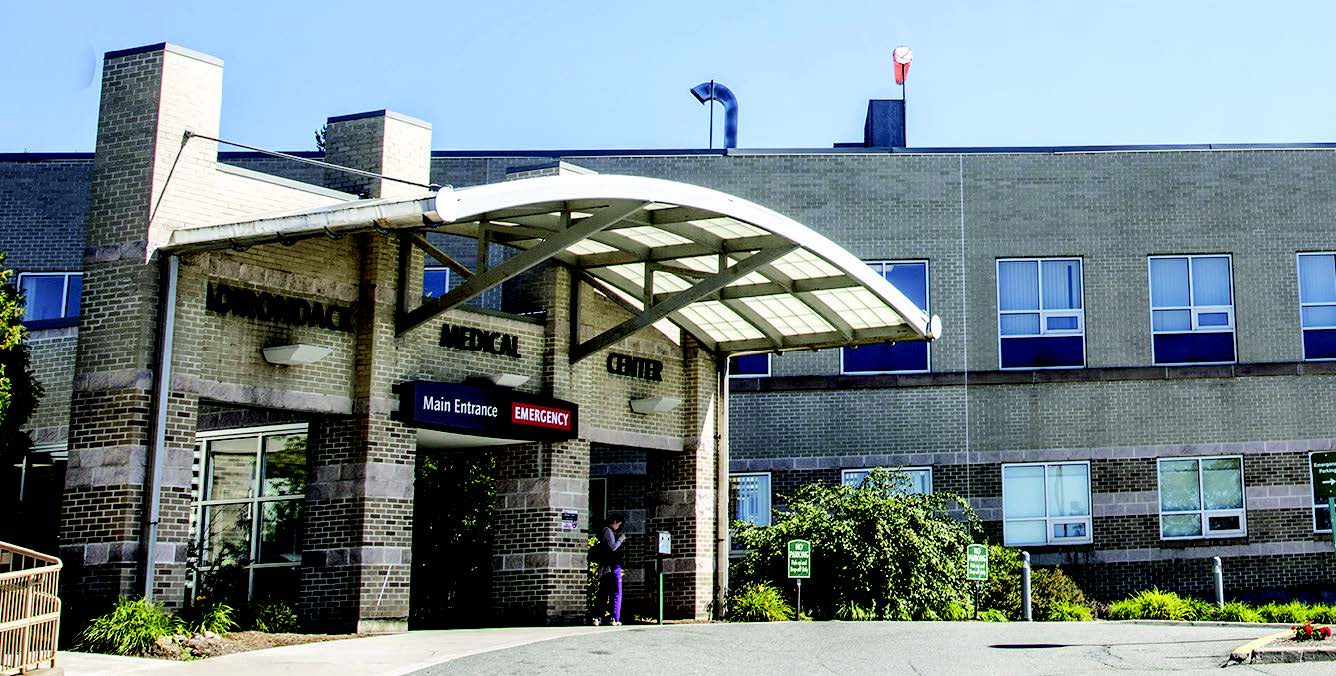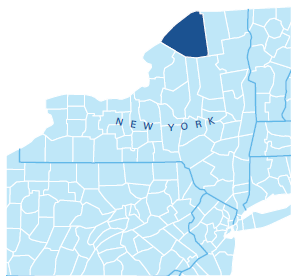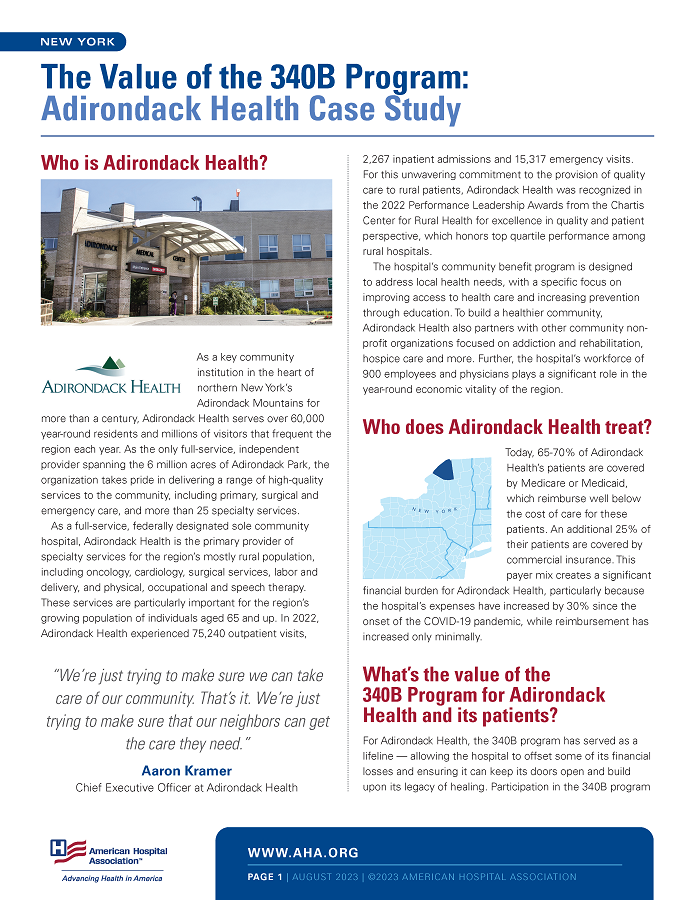

Adirondack Health | New York
The Value of the 340B Program Case Study
Who is Adirondack Health?

 As a key community institution in the heart of northern New York’s Adirondack Mountains for more than a century, Adirondack Health serves over 60,000 year-round residents and millions of visitors that frequent the region each year. As the only full-service, independent provider spanning the 6 million acres of Adirondack Park, the organization takes pride in delivering a range of high-quality services to the community, including primary, surgical and emergency care, and more than 25 specialty services.
As a key community institution in the heart of northern New York’s Adirondack Mountains for more than a century, Adirondack Health serves over 60,000 year-round residents and millions of visitors that frequent the region each year. As the only full-service, independent provider spanning the 6 million acres of Adirondack Park, the organization takes pride in delivering a range of high-quality services to the community, including primary, surgical and emergency care, and more than 25 specialty services.
As a full-service, federally designated sole community hospital, Adirondack Health is the primary provider of specialty services for the region’s mostly rural population, including oncology, cardiology, surgical services, labor and delivery, and physical, occupational and speech therapy. These services are particularly important for the region’s growing population of individuals aged 65 and up. In 2022, Adirondack Health experienced 75,240 outpatient visits, 2,267 inpatient admissions and 15,317 emergency visits. For this unwavering commitment to the provision of quality care to rural patients, Adirondack Health was recognized in the 2022 Performance Leadership Awards from the Chartis Center for Rural Health for excellence in quality and patient perspective, which honors top quartile performance among rural hospitals.
The hospital’s community benefit program is designed to address local health needs, with a specific focus on improving access to health care and increasing prevention through education. To build a healthier community, Adirondack Health also partners with other community non-profit organizations focused on addiction and rehabilitation, hospice care and more. Further, the hospital’s workforce of 900 employees and physicians plays a significant role in the year-round economic vitality of the region.
“We’re just trying to make sure we can take care of our community. That’s it. We’re just trying to make sure that our neighbors can get the care they need.”
Who does Adirondack Health treat?
 Today, 65-70% of Adirondack Health’s patients are covered by Medicare or Medicaid, which reimburse well below the cost of care for these patients. An additional 25% of their patients are covered by commercial insurance. This payer mix creates a significant financial burden for Adirondack Health, particularly because the hospital’s expenses have increased by 30% since the onset of the COVID-19 pandemic, while reimbursement has increased only minimally.
Today, 65-70% of Adirondack Health’s patients are covered by Medicare or Medicaid, which reimburse well below the cost of care for these patients. An additional 25% of their patients are covered by commercial insurance. This payer mix creates a significant financial burden for Adirondack Health, particularly because the hospital’s expenses have increased by 30% since the onset of the COVID-19 pandemic, while reimbursement has increased only minimally.
What’s the value of the 340B Program for Adirondack Health and its patients?
For Adirondack Health, the 340B program has served as a lifeline — allowing the hospital to offset some of its financial losses and ensuring it can keep its doors open and build upon its legacy of healing. Participation in the 340B program has further allowed Adirondack Health to continue providing a wide array of specialty services, including:
Infusion and Oncology Care
Adirondack Health's Merrill Center for Oncology — the sole outpatient oncology department in the Adirondacks — has long served residents of the Adirondack region with chemotherapy and infusion therapies for cancer and blood disorders. Supported by 340B savings, the center provides a variety of cancer treatments and wellness therapies including chemotherapy, participation in national clinical trials, an oncology exercise program, outpatient blood transfusions, genetic testing for cancer, and intravenous therapy. In addition, the 340B program has supported Adirondack Health’s oncology travel fund, which assists income-eligible cancer patients who need financial assistance with travel expenses related to their care.
Labor and Delivery Services
Adirondack Health uses 340B savings to support its labor and delivery services, a service line that would otherwise operate at a multi-million-dollar loss to the hospital. Through its Stafford New Life Center, the hospital offers inpatient services, including labor and delivery, patient-controlled epidurals, and prenatal, postpartum and nursery care. Last year, Adirondack Health delivered 194 babies. In addition, it offers outpatient maternity services including prenatal testing, breastfeeding consultations and childbirth education classes. Through this network of services supported by 340B, Adirondack Health helps ensure that patients are supported throughout their pregnancies and birth experiences.
Dialysis Services
The 340B program has been pivotal in supporting Adirondack Health’s dialysis unit, which offers in-house hemodialysis using state-of-the-art equipment, as well as assistance and support with at-home (peritoneal) dialysis treatments for patients experiencing kidney failure. Without these facilities, Adirondack patients would be forced to travel approximately 50 miles to receive equivalent care, which dialysis patients typically require 3-4 times per week. As a result, the existence of these services supported by 340B savings has been critical to removing barriers and improving adherence to dialysis treatments and outcomes for patients living with kidney disease.
340B Hospitals Need Support
The 340B Drug Pricing Program has been vital to Adirondack Health’s efforts to continue providing high-quality care amidst changes in the health care landscape.
Given its rural location and the hospital’s far-reaching catchment area, Adirondack Health has partnered with a network of local pharmacies to ensure that patients can access their medications at convenient locations. However, recent restrictions enacted by several of the largest drug companies have dramatically reduced the hospital’s 340B savings and hampered the ability to partner with local pharmacies and ensure access to care. In addition, these harmful actions have created a significant administrative burden for Adirondack Health — a small, independent facility that lacks the staff needed to comply with drug companies’ onerous and constantly evolving data requests. As a result, Adirondack Health’s employees are forced to spend significant time building data systems and maintaining data sets — time that could otherwise be spent on other efforts to optimize and improve patient care.
Unfortunately, Adirondack Health’s 340B status will likely expire at the end of 2023 due to changes in their payer mix and the expiration of a COVID-19 government waiver that allowed participating 340B hospitals continued access to the program despite their disproportionate share adjustment percentage falling below the required threshold. Even with the support of the 340B program, record inflation and an ongoing staffing shortage forced Adirondack Health to close under-utilized service lines, including its part-time emergency department in Lake Placid. The unfortunate result of any change to Adirondack Health’s 340B status is that these financial challenges will worsen and require difficult decisions to be made, including the potential need to curtail certain services that are important to the community.
Adirondack Health is a perfect example of the type of hospital Congress had in mind when it created the 340B program. It should remain in the program, despite changes to its payer mix. While Adirondack Health is exploring all options to preserve its 340B eligibility and will maintain its steadfast commitment to high-quality care, continuing to offer the same level of specialty services and community programs will be a considerable challenge.
The 340B program has allowed Adirondack Health to stretch federal resources to support its rural patients and community members for decades. It’s time for the federal government to take action and ensure that hospitals like Adirondack Health can remain in the 340B program and continue to serve their patients and communities.


